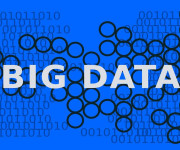3 Tools Companies Can Use to Harness the Power of Big Data

If a setup of that magnitude sounds out of reach for most small businesses, fear not. Big Data analytics are available from third parties who leverage the cloud and their data scientists to gather, store and process petabytes of data.
Big Data for Small Businesses
While traditional Big Data solutions cost hundreds of thousands of dollars, new Big Data service bureaus (like many other cloud-based applications) can provide useful information for a few dollars per user per month.
1. Sumall
Sumall offers free analysis of your total social media footprint, including email, Google analytics, Twitter and so on. You give them access to all your social media services, and they pull together more information than you ever could mine by yourself. Dane Atkinson, Sumall’s CEO, wants to help people working in businesses of all sizes live a “data-informed life.” Give Sumall access to PayPal, and it parses every transaction you’ve had with them, a deeper dive than the 90 days’ worth of reports PayPal provides. Cross-reference company tweets, Google+ announcements, Bing ads, and bitly links to see if your store sales have increased, and by how much. Try it for free.
2. Roambi
If your company can’t afford expensive business intelligence software, Roambi Analytics can be your mobile BI solution provider. The service focuses on delivering data visualization reports to mobile devices such as iPhones and iPads. Companies upload data, then configure updates to their cloud service portal, and get back visualized information that can be used immediately.
A restaurant business with three locations gave Roambi its employee scheduling spreadsheets and access to its payroll service, according to a report from ZDNet. After two weeks, the company figured out how to cut its costs by 10 percent.
While the virtual world is easy to track, thanks to analytics software, it’s much harder to get such precise data on customer activity in the physical world.
3. Euclid Analytics
Euclid Analytics, however, unravels that mystery and gives business insights into how their customers behave in their stores. Euclid’s solution gathers wireless data from brick-and-mortar stores and anonymously tracks customers via their smartphones. Every time a smartphone pings the local wireless network inside a store, Euclid Analytics can track, retain and then parse that information.
Are customers getting lost inside the store? Are they visiting all the departments? Do they head for sale areas following advertising? If not, you’ll know. Maybe the advertised products are in an area most shoppers don’t visit. If so, Euclid Analytics can tell you. Otherwise, how will you know where customers wander in your store — and where they don’t?
These are just three examples of how analytics can have a positive impact on small businesses.
The most important thing to know is how to leverage Big Data to make Better Decisions. Source























